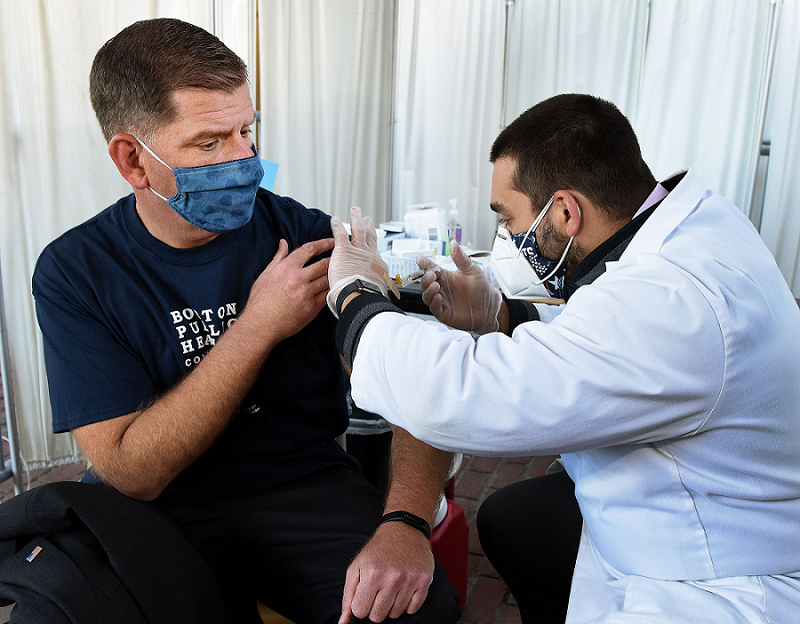Mayor Walsh, Boston health leaders urge residents to get flu shot during COVID-19
The City of Boston is offering flu vaccine vouchers for the uninsured and underinsured.
Mayor Martin J. Walsh and the Boston Public Health Commission (BPHC) are urging all Boston residents to get a flu vaccination as soon as possible during the COVID-19 pandemic.
"I got my flu shot today because we know the best way to protect yourself and your loved ones against the flu is to get a flu vaccine every season. And this year during the pandemic, it is more important than ever," said Mayor Walsh. "By getting vaccinated, you will help us slow the spread of the flu and ease the strain on our healthcare system that continues to treat patients battling COVID-19."
Most influenza activity in Boston occurs between October and March. During the 2019-20 influenza season, there were 5,131 confirmed cases of flu in Boston residents. Data from the end of the 2019-2020 flu season may not be complete due to the COVID-19 pandemic and shutdown.
The most common symptoms of influenza include fever, cough, muscle aches, headache, runny nose, sore throat and general weakness. Symptoms can range from mild to severe. Pregnant women, infants, people who are 65 years old and older, and people with other medical conditions (asthma, diabetes, heart disease, kidney disease) and weakened immune systems are at higher risk to develop severe illness when they get the flu.
"The flu is a serious virus and it is possible to have both the flu and COVID-19 at the same time. While there may not be a vaccine for COVID-19 yet, there is a vaccine for the flu. That is why it is critical that everyone 6 months of age and older get a flu vaccine as soon as possible," said BPHC Medical Director, Jennifer Lo, MD.
Differences between COVID-19 and FluBecause the symptoms of flu and COVID-19 are similar, it may be hard to tell the difference between them based on symptoms alone. Testing may be needed to help confirm a diagnosis.
| Question | COVID-19 | Flu |
|---|---|---|
|
How many days after exposure will I get sick from the virus?
|
2-14 days, but usually between 4 and 7 days |
1-4 days |
|
How long can someone spread the virus?
|
2 days before symptoms start to 10 days after symptoms started |
1 day before symptoms start to 7 days after symptoms started |
|
How does the virus spread?
|
Mainly by respiratory droplets |
Mainly by respiratory droplets |
|
Who is at high risk for complications? |
|
|
|
How can a person infected be treated?
|
Primarily treated with supportive care
Remdesivir is an antiviral agent that is currently used for moderate to severe cases of infection
|
Primarily treated with supportive care
Antiviral drugs should be used as soon as possible |
|
Is there a vaccine against the virus? |
No. Research and development for a vaccine is underway. |
Yes. There are multiple vaccines produced annually.
|
"We can all do our part to keep our families healthy and prevent hospitalizations from the flu by getting vaccinated. People who are not at risk for severe illness can pass the infection to their families, friends and neighbors," said Chief of Health and Human Services Marty Martinez. "We're asking everyone six months of age and older to get a flu vaccine. Do not wait. Get yours today and help protect your Boston community."
There are a variety of flu vaccination options available, most of which are completely covered by health insurance:
-
Primary Care Provider: Most health insurance plans cover the cost of a flu vaccine from your primary care provider and require no co-pay.
-
Pharmacies: Many pharmacies offer the flu vaccine at no cost to the patient. Due to COVID-19 public health emergency, many pharmacists in Massachusetts are now able to vaccinate those who are 3 years old and older. For pharmacies, individuals are encouraged to call ahead to confirm availability and any required documentation.
If residents do not have insurance or if co-pays are a barrier, BPHC encourages them to call the Mayor's Health Line at 617-534-5050. BPHC is providing vouchers for free flu vaccines to uninsured or underinsured adults.
In addition to a flu vaccine, there are other ways to prevent the spread of respiratory illnesses like the flu and COVID-19:
- Wear a face covering
- Wash your hands often with soap and water or use an alcohol-based hand sanitizer
- Cover your mouth and nose with your elbow or a tissue when you cough or sneeze
- Clean surfaces in your home regularly with a household cleaner
- Avoid close contact with people who are sick when possible
- If you become sick, stay home
For questions about the flu or flu vaccines, please call the BPHC Infectious Disease Bureau at 617-534-5611. For those with no insurance or if co-pays are a barrier, please call the Mayor's Health Line at 617-534-5050. Fact sheets on the flu vaccine are available in English, Cape Verdean Creole, Chinese, Haitian Creole, Portuguese, Spanish and Vietnamese.


